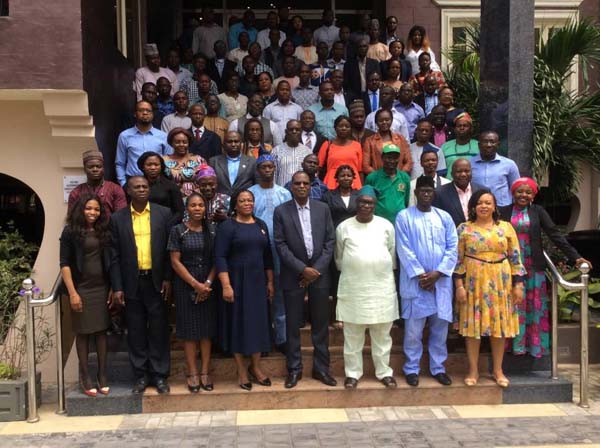More News
Climate Change, A Development Issue – Tarfa

By Chuks Ekpeneru
Director, Climate Change Department, Federal Ministry of Environment, Dr. Yerima Tarfa has urged state governments to lead and provide strong coordination for all the climate change adaptation activities across the State.
Dr. Tarfa gave the advise at the ongoing Two-Day South West Regional Knowledge Deepening Workshop on Climate Change in Lagos on Monday.
The Workshop is being organised by the Department of Climate Change in collaboration with the United Nations Development Programme (UNDP) and Lagos State Government.
The Regional Climate Change Deepening Workshop on Climate Change will hold across the six (6) geo-political zones to deepen collaboration and synergy with sub-national government on climate change issues, its impacts and possible adaptive and mitigation measures available to curb its effect.
Tarfa in his presentation titled “Strengthening the Institutional Capacity of States and Local Governments and collaboration on Climate Change Response Measures” also urged the states to engage in climate change awareness programme; Collaborate with the Department of Climate Change in the Federal Ministry of Environment; Mainstream climate change activities in to the State Development Plan; Have a Desk, Department or Agency mandated to implement climate change activities.
He also said that States and Local governments should shore up activities in afforestation and reforestation activities with the potential of earning carbon credits under the clean development mechanism (CDM); Facilitate the implementation of the adaptation strategy through all the sectors, coordinating with the Federal and Local Governments; Provide a platform for CSOs, the organized private sector and government to share information and harmonize activities; Recognize and engage CSOs, the organized private sector and international partners as stakeholders in creating and implementing climate change adaptation policies, and work with these groups to ensure the adaptation policies are gender-sensitive; Mainstream climate change adaptation into all existing and new Development Plans and official Vision statements, and into all existing and new sectoral policies and programmes; Ensure that climate change adaptation is taken into account when drawing up the State’s Annual Budget; Actively and consistently strengthen inter-ministerial and inter-agency coordination and cooperation in climate change adaptation in the State; Create an enabling environment for the organized private sector to invest in climate change adaptation, including business opportunities presented by climate change adaptation options.
Tarfa said the issue of climate change has become a developmental issue that affects all facets of human existence.
According to him, “Recent scientific information from the Inter-governmental Panel on Climate Change (IPCC) Assessment Reports confirms the world is on course for levels of warming that will be catastrophic for Africa.
“Further to this, there is indication that temperature rises are likely to be progressively higher in Africa with other climate related effects such as variability in precipitation patterns and the frequency of extreme weather events placing considerable pressure on livelihoods and economies across the continent; loss of food security; natural disasters; a vanishing of coastlines; human displacement; natural resources depletion; a lack of clean and accessible water; animal migration and pest management issues; diseases and other health issues; a loss of cultural practices and traditional ways of life; economic downturns, energy crises etc.
Climate Change Specialist, Professor Emmanuel Oladipo in his presentation titled “Overview of the role of States in tackling Climate Change and reporting Obligations to the UNFCCC/Kyoto Protocol and the Paris Agreement” stated that it is critical for each state to be able to respond to the challenges of climate change.
Oladipo said climate change could stall and even reverse human development in the critical areas of Agricultural production and food security; Water stress and water insecurity; Rising sea levels and exposure to climate disasters; Ecosystems and biodiversity and Human health.
He challenged the DCC to ensure proper coordination of policy development and programmes for climate resilient development across all sectors of State’s development; Information and data management; Public awareness, education, research and science; Mobilization of climate finance and other resources including funds from the private sector, and National and international cooperation and negotiations.
Earlier, in an opening remarks, the Permanent Secretary, Federal Ministry of Environment, Mrs. Ibukun Odutose said that Climate Change has become a critical issue, both for its global importance and threats to National development.
She said: “we have the desertification process advancing southward and potential submergence of the 853 kilometers stretch of coastline along the Atlantic Ocean.
“Nigeria recognizes with great concern this threat that climate change poses to livelihoods, economic sustainability and health and the imperative to embed climate change issues within the context of its work in the country.
“Overcoming the development challenge of climate change requires that appropriate mitigation and adaptation measures are implemented in a coherent and integrative manner in which they are appropriately mainstreamed into national programs and projects for sustainable development.
“The Government of Nigeria regards the challenge of climate change as inimical to its national sustainable development that must be squarely addressed. Thus, various national efforts have been put in place at all levels of governance to promote climate resilient environmental sustainability in the context of national development.
“These efforts range from putting policies and legislation in place to building institutional capacity, effective participation in global climate change negotiations and signing international agreements, building partnerships, sourcing funding and embarking on some initiatives for climate change response.
States in the South-West are expected to present their various challenges and measures put in place to tackle debilitating effects of climate change during the two days workshop.
And For More Nigerian News Visit GWG.NG


